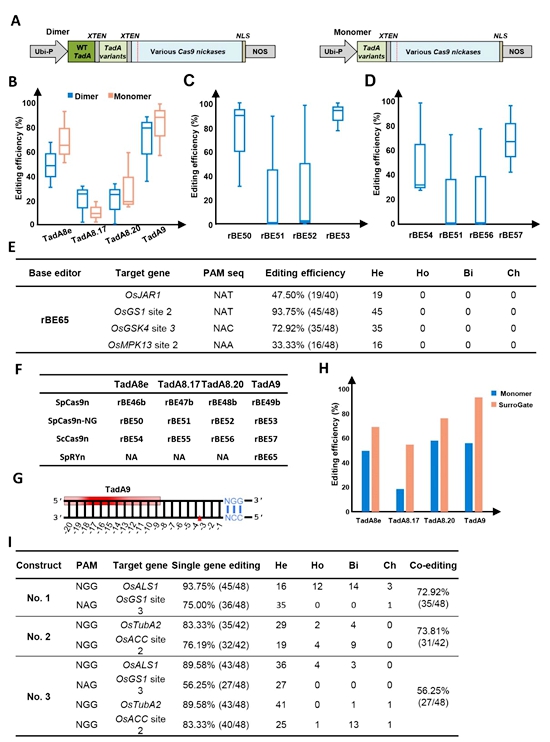Development of an Efficient Adenine Base Editor that Edits Four Herbicide Genes in Rice Simultaneously
Adenine base editors (ABEs) have been successfully developed for precise targeted modification of endogenous genes in plants. However, all the available ABEs have shown significantly varying editing efficiencies among different genomic loci in plants, which deeply limits the application of this technology. Recently, a research article entitled “Multiplex Gene Editing in rice with the high-efficiency TadA9 Variant” was published in Molecular Plant by Professor Zhou Huanbin’s research group from the Institute of Plant Protection, Chinese Academy of Agricultural Sciences (IPPCAAS). In this paper, the authors optimized and improved rice adenine base editing technology by modifying the adenosine deaminase TadA and simultaneously edited four endogenous herbicide-target genes by the novel TadA9-mediated base editing.
To optimize and upgrade the existing ABEs in rice, the authors investigated the editing efficiency of three evolved E. coli adenosine deaminase TadA variants and showed TadA8e outperforms TadA8.17 and TadA8.20. They also developed a novel version of TadA9 by introducing V82S/Q154R mutations into TadA8e. TadA9 has enlarged the editing window with an equivalent or even higher editing efficiency when compared with TadA8e. Especially, TadA9 showed robust editing capabilities for target sites that were difficult to edit before. By adopting TadA monomer strategy and integrating it into the SurroGate system, the efficiency of ABEs at multiple test targets was gradually increased to over 90%, which was comparable to the performance of CRISPR technology in target gene knockout. The team successfully modified four herbicide target genes in the elite rice variety Nangeng46 simultaneously by using rBE49b which is composed of TadA9. The editing efficiency of the four targets reached 56.25%, while that of the three target genes was higher than 80%.
The highly efficient optimized adenine base editors developed in this study have greatly expanded the application of single-base editing technology and will play a significant role in the field of plant functional genomics and precision breeding of crops. A Chinese invention patent has been authorized to the relevant technology (patent No. ZL 2020 1 1308944.7).

More details can be found at the link below:
https://doi.org/10.1016/j.molp.2021.02.007
By Zhou Huanbin (hbzhou@ippcaas.cn)
-
 Apr 18, 2024Opening Ceremony of the Training Workshop on Wheat Head Scab Resistance Breeding and Pest Control in Africa Held in CAAS
Apr 18, 2024Opening Ceremony of the Training Workshop on Wheat Head Scab Resistance Breeding and Pest Control in Africa Held in CAAS -
 Apr 03, 2024IPPCAAS Co-organized the Training Workshop on Management and Application of Biopesticides in Nepal
Apr 03, 2024IPPCAAS Co-organized the Training Workshop on Management and Application of Biopesticides in Nepal -
 Mar 28, 2024Delegation from the School of Agriculture and Food Science of University College Dublin, Ireland Visit to IAS, CAAS
Mar 28, 2024Delegation from the School of Agriculture and Food Science of University College Dublin, Ireland Visit to IAS, CAAS -
 Mar 25, 2024Director of World Food Prize Foundation visited GSCAAS
Mar 25, 2024Director of World Food Prize Foundation visited GSCAAS -
 Mar 20, 2024Institute of Crop Sciences (ICS) and Syngenta Group Global Seeds Advance Collaborative Research in the Seed Industry
Mar 20, 2024Institute of Crop Sciences (ICS) and Syngenta Group Global Seeds Advance Collaborative Research in the Seed Industry
